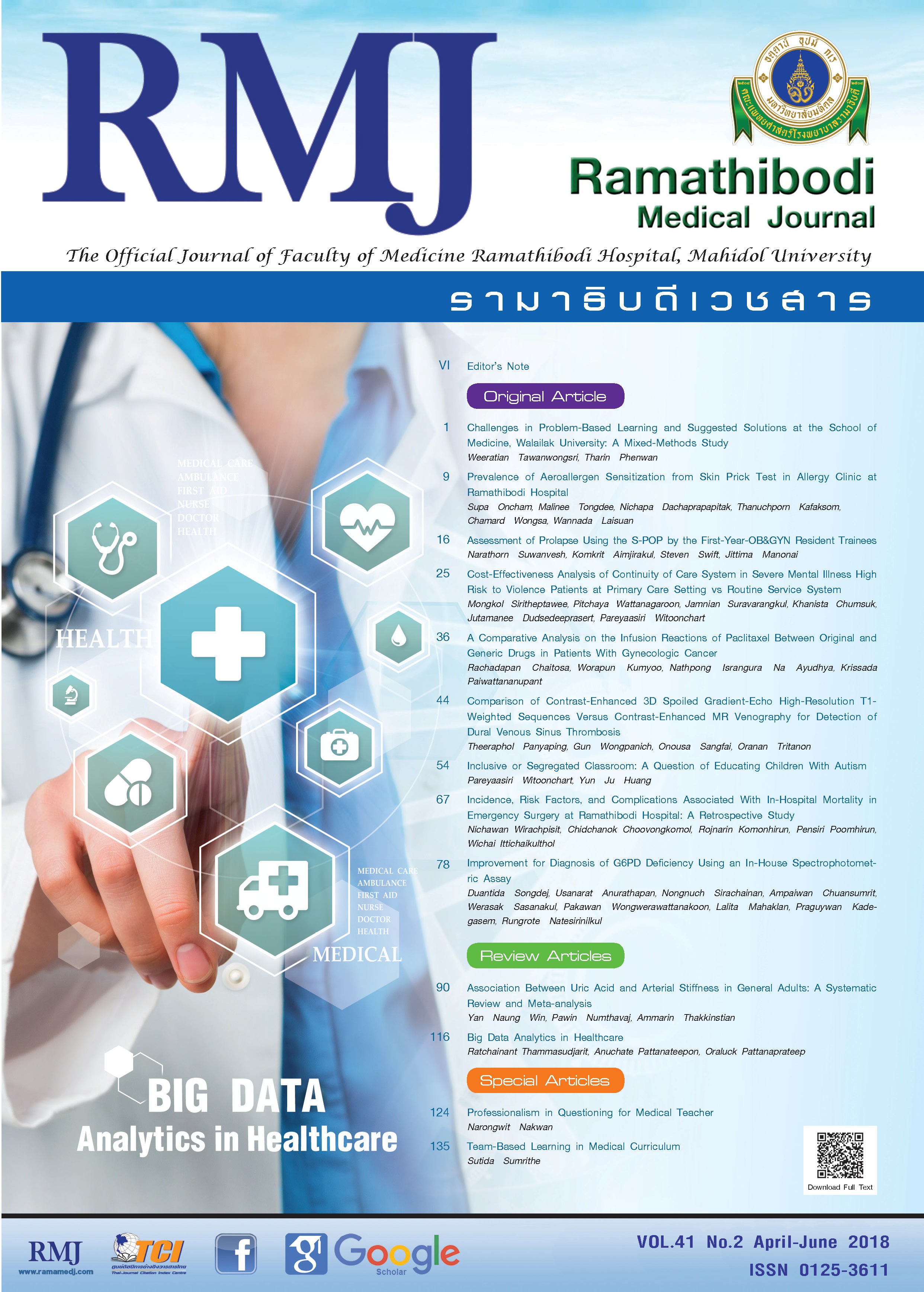Cost-Effectiveness Analysis of Continuity of Care System in Severe Mental Illness High Risk to Violence Patients at Primary Care Setting vs Routine Service System
DOI:
https://doi.org/10.14456/rmj.2018.16Keywords:
Continuity of care, Severe mental illness high risk to violence patientAbstract
Background: The mental illness high risk to violence patients are a part of the mental illness patients that need to have continually well care. Since these patients have tendency of psychiatric relapse and mental health risks, the continuity of care system in mental illness patients project was created.
Objective: To compare the cost and effectiveness by using cost-effectiveness analysis between continuity of care system (home health care service every 1 month) in severe mental illness high risk to violence patients at primary care setting versus routine service system in provider perspective.
Methods: Data was derived from randomized controlled trial study between 1 January, 2016, to 30 June, 2016. The psychiatric patients which had diagnosed with F200 - 299 and 1 or more criteria of severe mental illness high risk to violence were recruited to the research.
Results: There were 105 patients for continuity of care system and 107 patients for routine service system. The frequency of psychiatric relapse and mental health risks (violence and re suicide) of patients for continuity of care system was lower than routine service system or 0.14 of patients with relapse and mental health risks in continuity of care system were lower than routine service system. The incremental cost-effectiveness ratio was -13,738.5 baht per patient. Number needed to treat (NNT) of relapse and mental health risks was 27.27 and rehospitalization was 90.9.
Conclusions: This study showed that the continuity of care system can reduce relapse, violence and mental health risks in severe mental illness psychiatric patients.
References
Wattanagaroon P, Jirauraipong K, Teangthum S, Warakornamorndech N, Chumputhra P. Manual of continuity of care guideline in severe mental illness high risks to violence in community. Bangkok, Thailand: Sangchun Publisher; 2017.
Triruangworarat B. DMH Declaration of chronic psychiatric patient in community committees under the NHSO fund, 2017. Department of Mental Health, Ministry of Public Health, Thailand. https://110.164.191.88/caretransition. Published April 5, 2017. Accessed May 22, 2018.
Ministry of Public Health. Criteria for Health Network Development. 1st ed. Nontaburi, Thailand: Ministry of Public Health; 2011.
Chaikredkheaw U, Treerawatananon Y. Thailand health technology assessment manual. 2nd ed. Bangkok, Thailand: Watcharin P.P. Publisher; 2013.
Bond GR, Drake RE, Mueser KT, Latimer E. Assertive community treatment for people with severe mental illness. Disease Management and Health Outcomes. 2001;9(3):141-159. doi:10.2165/00115677-200109030-00003.
Clark RE, Teague GB, Ricketts SK, et al. Cost-effectiveness of assertive community treatment versus standard case management for persons with co-occurring severe mental illness and substance use disorders. Health Serv Res. 1998;33(5 Pt 1):1285-1307.
Adamou M. Community service models for schizophrenia: evidence-based implications and future directions. Psychiatry (Edgmont). 2005;2(2):24-30.
Roberts E, Cumming J. Nelson K. A review of economic evaluations of community mental health care. Med Care Res Rev. 2005;62(5):503-543. doi:10.1177/1077558705279307.

















